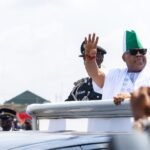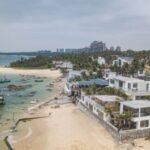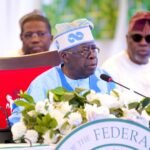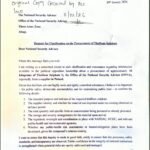– After reading this well researched article about Ibadan then you will have more respect for Olubadan’
D.O. FAGUNWA
The writings of D.O Fagunwa in Ibadan, encouraged the writings of Amos Tutuola, a barely literate man, who was born in 1920 in Abeokuta, but lived his life in Ibadan, until his death at the age of 77 in 1997. Amos Tutuola, was a Store keeper, with the Nigerian Broadcasting Corporation in 1956. Despite his short formal education, he joined the Ibadan Writers Elite- the Mbari Mbayo Club of Ulli Beier and Wole Soyinka. He was the author of the popular book “The Palm-wine Drunkard” in 1952.
Ibadan Firsts The University of Ife, now Obafemi Awolowo University, Ile-Ife, founded in 1962, started from the present North Campus of the Ibadan Polytechnic, then known as the Nigerian College of Arts and Science. It took its first set of 244 students on the 22nd of September 1962, with five faculties; – Agriculture, Arts, Economics, Social Studies (now Social Sciences), and Law. The university resided in Ibadan until January 1968, when it finally relocated to its new permanent Campus in Ile-Ife. It’s first Vice Chancellor was Professor Oladele Ajose, succeeded in 1966 by Professor Hezekiah Oluwasanmi, a University of Ibadan Agricultural Economist.
ADEKUNLE FAJUYI
In recognition of Governor Adekunle Fajuyi’s efforts, in the early relocation of the University to Ile-Ife, (when he was the then governor of the Western region), the first male hostel- Fajuyi Hall, was named after him.
Ibadan in its early life, had served as the Administrative centre and capital of the Western Region since 1949. In fact, the first General Conference, to fashion out a new constitution for Nigeria, was held in Ibadan between January 9th and 30th of 1950.
IBADAN, NIGERIA’S HOME OF MANY FIRSTS
Ibadan became the home of many firsts, due to the progressive governance, political wizardry and economic sagacity of the Awolowo led Action Group-
– the first television station in Africa on the 31st of October 1959,
– the first stadium-the liberty stadium, patterned after the popular Wembley Stadium in London. This 25,000 capacity seat football stadium and the first stadium to be built in Africa, was officially opened in 1960, and also built during Awolowo’s tenure as the Premier of the Western Region. It was officially renamed the Obafemi Awolowo stadium on the 12th November 2010 by the then President Goodluck Jonathan, during a courtesy visit to the late sage widow; Mama HID Awolowo.
– Amongst the firsts also, is the popular 24 storey sky scraper- the Cocoa House,
– the first dualised road in Nigeria- named The Queen Elizabeth road, from Mokola to Agodi Secretariat, officially declared open, by the visiting Queen Elizabeth II in 1956 and also the popular University College Hospital (U.C.H) , the first teaching hospital in Nigeria, patterned after the University of London Teaching Hospital (ULTH), was also officially commissioned by the Queen, during this historic visit to Nigeria in 1956.
– It is equally important to remember the first Re-diffusion in Nigeria; the one channel Radio Station,
– the Agodi Government Secretariat being, the first in Nigeria and the first Modern Parliament that housed the Regional House of Assembly and the House of Chiefs.
– The first Housing Estate in Nigeria- the Bodija Housing Estate was also built and developed in 1958.
– Ibadan also had the first highly organized and structured Civil Service in Nigeria, with the Simeon Adebos, Saburi Biobakus, as its founding lights.
– The free education programme of the Awolowo government, the first in Nigeria, was launched in Ibadan, in 1954.
– As a honeypot, Ibadan became the home of the first set of Research and Training institutes in Nigeria; – –
The Forestry Research Institute (1930), the Idi-Ayunre
Cocoa Research Institute (CRIN),
The Nigerian Cereal Research Institute Moor Plantation (NCRI),
the NIHORT (Nigerian Institute of Horticultural Research),
the NISER (Nigerian Institute of Social and Economic Research),
IAR&T (Institute of Agriculture, Research and Training), amongst several others.
OLUSEGUN OBASANJO
Ibadan made people and moulded characters. Olusegun Obasanjo, from his teaching desk at the African Church Modern School, Ago Tailor, Odo-Ona Ibadan in 1957, where he taught General Science and Religious knowledge from Modern 1-3, he took the Cadetship examination into the Nigerian Army and passed, and enlisted formalities concluded in March 1958. Obasanjo came back to Ibadan almost 10 years thereafter, as the Commander of the Second Area command of the Nigerian Army Ibadan and an automatic member of the State Executive Council of the then Brigadier Robert Adeyinka Adebayo’s government in the Western Region. Obasanjo in Ibadan, began to interact with the Ibadan elites, lecturers and administrators, most especially from the University of Ibadan through the Town and Gown forum- a forum of interaction between the University of Ibadan and the community.
He also interacted with other sectors of the community, like the Political, Business and Cultural sectors of the community.
UKPABI ASIKA
It was from these interactions, that he consummated the friendships of many Ibadan intellectuals. It was Professor J.F Ade Ajayi, on the request of Olusegun Obasanjo, that scouted for Anthony Ukpabi Asika, a 31 year old radical teacher of Political Science at the University of Ibadan, to be made the Civilian Administrator of East Central State of Nigeria on the 29th of October 1967.
CHIEF GABRIEL IGBINEDION
Chief Gabriel Osawarun Igbinedion, now the Esama of Benin, was once a young Police Officer in Ibadan in the 1950s.
MKO ABIOLA
Moshood Kashimawo Olawale Abiola, in 1956, started his working life as a Bank clerk with the Barclays Bank Plc. Dugbe, Ibadan. After two years as a Bank Clerk, he joined Western Region Finance Corporation, as an Executive Account Officer, before leaving for Glasgow University Scotland, to pursue his higher education, on the Western Region of Nigeria scholarship. He received a first class degree in Accounting and also had a distinction from the Institute of Chartered Accountant of Scotland. He was at a later time in his life, conferred with the Chieftaincy title of Bashorun of Ibadan land.
SPOUSAL RELATIONSHIPS
In Ibadan, future spousal relationships strived, most especially within the University Community;
Laide and Wole Soyinka,
Ayo and Adetoun Ogunseye,
Ojetunji and Bimpe Aboyede,
Chinua and Christy Achebe, Olumuyiwa and Bolanle Awe, Yetunde Oyebode, daughter of Late Bishop Oyebode and Okunade Sijuwade, later Ooni of Ife, Christopher Okigbo and Judith Safinat Attah,
Adepoju and Aderenle Taiwo, Olusegun and Funke Agagu, amongst several others.
GENERAL YAKUBU GOWON Interestingly, Major General Yakubu Gowon succeeded General Agunyi Ironsi as Head of State of Nigeria, on the 1st of August 1966 as a result of the Coup d’état of July 29 1966, when he was just 32 years old and a bachelor. To change from the status of a bachelor Head of State, he got his legal spouse in Ibadan,- A University College Hospital (UCH) Ibadan trained nurse; Miss Victoria Zakari, whom he married in April 1969, with Navy Commodore Akinwale Wey, the Chief of Staff, Supreme Military Council as his best man at the marriage.
Ibadan University Town and Gown relationship blossomed with the Mbari Mbayo club founded by Professor Ulli Beier, a German, who came to Ibadan as a lecturer in 1956, Wole Soyinka, Christopher Okigbo, Duro Ladipo, Kola Ogunmola, Amos Tutuola, and so many others. Also, the Players of the Ibadan Dawn Group of Olusegun Olusola and Christopher Kolade was also formed in 1958-1959, when the first Television station in Africa, W.N.T.V was being opened.
DEATH OF AGUIYI IRONSI AND ADEKUNLE FAJUYI
On July 28th 1966, General Aguiyi Ironsi as Head of State, addressed a meeting of traditional rulers from all over the country in Ibadan. He planned to return to Lagos after his address, but choose to pass the night at the Government House with his host- Colonel Adekunle Fajuyi, the Governor of the Western Region. There was a post conference dinner held in honour of the Traditional rulers who attended the conference. The conference was held principally to rally support for the Ironsi Unification Decree number 34 of May 1966, which merged the country into a unitary entity. It was his last official assignment as the Supreme Military Commander and Head of State. In the midnight, Captain T. Yakubu Danjuma, the officer detailed to provide protection for the Supreme Military Commander in Ibadan, turned out to be the officer who led the Mutineers to kill his boss- Ironsi and his host- Adekunle Fajuyi. After their arrest, Colonel Adekunle Fajuyi, being a good host and a thorough bred Yoruba man, insisted that he should be picked alongside the visiting Head of State. They were moved to Lalupon, a community in Ibadan, on Iwo road, where they were killed and buried in shallow graves. Lieutenant colonel Hillary Njoku, ADC to the Supreme commander, however managed to escape. The leaders of the July 29 1966 putsch, included Major Muritala Mohammed, Major Abba Kyari, Captain T. Yakubu Danjuma, Major Martin Adamu, and Major Joe Akahan.
THE CONTRADICTIONS
Ibadan also has its contradictions.
It was the home of the Agbekoyas who resented the new tax regime of Brigadier Adeyinka Adebayo in November 1968. The Governor increased taxable adult tax from £1pound, 17 shillings, 6pence to £8 pounds. The Agbekoyas, resented and protested against this arbitrary increase, and on the 11th of November 1968, the Agbekoya crisis came out full blown, when thousands of agitators marched from the Mapo hall, armed with sticks, cudgels and weapons, to express their rejection of the new tax, as announced by the Governor. A combined team of Policemen and Soldiers opened fire on the demonstrators in Mapo, killing about 20 people. The agitators soon spread to other parts of the Western Region. The Agbekoya group was led by Mr. Tafa Adeoye, renowned farmer/hunter from Akanran, in Ibadan. The government effort to arrest Tafa Adeoye, the strongman leader of the Agbekoya, who was reputed to be all charms, was only made possible through a pretty police detective, who was detailed to carry out intelligence surveillance on Tafa Adeoye. The lady, approached the leader of the Agbekoya group for a relationship. Tafa fell in love with her and “Married” her. The trap was successful. After a few weeks of the relationship of Tafa and his” wife”, plain clothes policemen, entered his residence and arrested him for the offence of organizing tax agitators against the Government.
The Ibadan business landscape, in the early days was also nurtured by the pioneering efforts of two Ijebu brothers, who were business titans, of the same parents- Adeola Odutola (1902-1995) and his brother Jimoh (1905-2010). Adeola was literate and a Christian, and Jimoh, though not literate was a self-made man, and till his death spoke impeccable English and spoke like a professor. He was a Muslim. Their father was also a Muslim, while their Mother, Sabina was a Christian. The duo went into a partnership- the Odutola Brothers. Jimoh started the first tyre factory and also the first Foam factory in West Africa, in Ibadan. Jimoh’s tyre factory in Ibadan was so successful, that he was invited by the Government of Kenya and Ghana to set up similar companies over there. He lived to a ripe age of 105 years and remained throughout his life an epitome of modesty.
Interestingly, Adeola was the father of Professor Mrs. Oyin Olurin, a doyen of Ophthalmology in Nigeria and resident in Ibadan, whilst Jimoh was also the father of Professor Mrs. Ebun Clark, a pioneer of Theater Arts in Nigeria and wife of J.P Clark who wrote the popular poem-”Ibadan”.
It will still not be easy to forget the pioneering efforts of Chief Theophilus Adediran Oni, popularly known as T.A Oni and Sons (adulterated as Oni o Suwon) in the building and construction industry in Nigeria. He was born in Oke-Mesi, Ekiti State in 1913 and died in February 1975. His company was the first indigenous construction company in Nigeria. Chief Oni’s most notable act of kindness, was willing his family estate to charity, as a clear demonstration of his high level degree of philanthropy and love for the city of Ibadan. He willed his residence- Goodwill House, to the Oyo/Western state government, to be used as a Paediatric Hospital, which is now known as T.A. Oni Memorial Children Hospital, Ring Road Ibadan. This sprawling family Estate and residence was cited on a 15acre piece of land, 65 rooms, with modern conveniences, Olympic Swimming Pool, and stable for Horses etc. Alhaja Humoani Alaga, Alhaja Humoani Alade and Madam Janet Alatede Aboderin (mother of Olu Aboderin and Ajibola Ogunsola), Alhaja Rabiatu Adedigba Akindele (mother of Chief Bode Akindele) and the first Woman to go on Holy Pilgrimage to Mecca, were also Ibadan women of great business acumen in the early days. Mama Chief HID Awolowo, was also prominent in the textile business and her textile store in Gbagi Ibadan, known as Awolowo corner, was very prominent. As resentment to non-admission of Christian girls to a girls mission school in Ibadan, Alhaja Humoani Alaga, single handedly established Isabatudeen Girls’ Grammar School Ibadan in 1964. Humoani established her textile trading business in 1928 and in 1933, she had become a successful merchant with properties in Nigeria and in the United Kingdom. The succeeding generations of the early Ibadan business titans, were the likes of Chief Bode Akindele, who single handedly, established so many factories in Ibadan-Standard Breweries, Standard Packaging, Standard Plastics, Doctor Pepper Soft Drink factory, all in Alomaja Ibadan, and also a Matches Production factory in Eleyele Ibadan. Chief Bode Amoo also established Bode Foams and Atlantic Carpets in Ajoda and Olodo Ibadan respectively. Jimoh Ibrahim Inaolaji of Ikire, Adekambi Amoo; a.k.a Ti Oluwa ni yo se A. Amao of Ibadan, Chief S.O Bakare (Oluwalogbon Motors) were also astute businessmen. Alhaji Arisekola Alao, born on the 14th of February 1945, started as a trader of insecticides (Gamalin 20), in Agodi Ibadan in 1961, and soon became a foremost Ibadan Industrialist and Philanthropist. He established a fleet of business outfits under the Lister Conglomerate, which had cut across; Food Production, Real Estate, Insurance, Transport, and Publishing. He became the Aare Musulumi of Yoruba land in 1980, amongst several others.
LEBANESE CONNECTION
Perhaps the history of Ibadan early business titans would not be complete, without mentioning the impact of the Lebanese community in Ibadan’s early business growth and development. A leading trailblazer among the Lebanese community was the Zard family, who settled in the early 1930’s and has grown and prospered in Ibadan. The current leading lights of the Zard Family were Maurice, Wadji, and Raymond, who was born at the Jericho Nursing home Ibadan on the 27th of May 1938 and became a Naturalized Nigerian and the holder of a National award of OFR. He is the Balogun Babalaje of Ibadan land. The Zard business empire includes; Zartech, Kopek Construction limited, Interpac limited, Energy foods, Livestock, Poultry, and fish farming, and they were believed to hold a sensible portion of the landed property of Iyaganku, Dugbe, the commercial nerve centre of Ibadan, and Oluyole amongst several other investments in Ibadan. Their Parents, Kalil and Latife Zard were one of the early pioneers of cocoa business in Ibadan land.
IBADAN PEOPLE’S PARTY,
IPP In the city of Ibadan, in the early 50’s, was the rising importance of the Ibadan People’s Party (IPP) which was established in June 1951, with Chief Augustus Meridith Adisa Akinloye as the founding chairman and other members were;- Chief S.A Akinyemi, Chief Samuel Lana, former Olubadan of Ibadan land, Chief Daniel Tayo Akinbiyi, also former Olubadan, Chief S. Ajuwon, Chief S.A Aderounmu, Chief R.S Biobaku, Chief Akin Allen, Chief Akiniyi Olunloyo, Chief Owoade Lanlehin, Moyosore Aboderin, Richard Osuolale Akinjide, and Adeoye Adisa. Akinjide, who qualified as a lawyer on the 4th of March 1956, came back home to join the grass roots politics of Adelabu, who found Akinjide’s legal prowess amazing, in the celebrated case of Slapping a (Customary Court) Judge- D.T Akinbiyi (later Olubadan) , Akinjide was the younger counsel, to Dingle Foot QC- the British Lawyer, hired by Adelabu for his defense. As a payback, Akinjide was elected into the Federal Parliament at the age of 27, in 1959, with an official emolument of £840 pounds per annum, i.e. almost £70 pounds a month. He however, became a Minister in 1965 at the age of 34. Ibadan’s politics by the 50’s was thick, emerging, and interesting. When Adegoke Adelabu, the flamboyant politician, as Chairman of Ibadan District Council, was accused of corruption, the Ibadan people quickly retorted- “Adelabu ma ko wo wa je, igunnu lo ni tapa, tapa lo ni igunnu” (Adelabu, Continue to steal our money the more, Igunnu owns Tapa, Tapa owns Igunnu).
In the growth of Ibadan, one would not also forget the early legal luminaries who practised then, mostly in Ibadan. Mojeed, Gani and Yekinni Agbaje, Ayo Rosiji, Chief S.L Durosaro, Obafemi Awolowo, Chief S.L Akintola, Abiodun Akerele, Olajide Olatawura, Busari Obisesan, Layi Ogunsola, Adeoye Adisa, Chief FRA Williams, who also practised in Ibadan, before relocating his practice to Lagos, Kayode Eso, who also relocated his practice from Jos to Ibadan, Samuel Agbaje Williams, Emmanuel Fekayode, Olufemi Ayoola and his brother Olayinka Ayoola, Alhaji Bolarinwa Oyegoke Babalakin, later retired Justice of the Supreme Court, Mrs. Folake Solanke, who practised in Rotimi Williams Chambers in Ibadan in 1963, Akin Aguda, and S.O Ighodaro. Others were Chief SPA Ajibade, Gboyege Ademola, the Greek Cypriot Lawyer, E.H Lembron, Afe Babalola, and Victor Esan, the husband of the first Ibadan woman senator, and later Iyalode of Ibadanland- Chief Mrs Wuraola Esan, Kola Daisi, amongst several others.
Ibadan of course was the home of Veteran Journalists and Broadcasters;- Lateef Jakande, Akintunde Emiola (now Professor of Law), Olaniran Ogunyemi Ogungbemi, Akin Otiko, Dokun Famubode, Mrs Anike Agbaje Williams, Julie Coker, Ronke Darley, Adebayo Sanda, Yemi Farounbi, Adebayo Faleti, Peter Ajayi, Labanji Bolaji, Areoye Oyebola, Felix Adenaike, Banji Kuroloja, Agboola Sanni, Adebayo Williams (now Professor), Segun Osoba, Folu Olamiti, Peter Apesin, Biodun Oduwole and several others.
The first oldest and surviving Newspaper in Ibadan and Nigeria- the Nigerian Tribune, established by Chief Obafemi Awolowo in Agbadagbudu, Yemetu Ibadan in 1948 and the Daily Sketch, the WNTV, WNBS, the Radio Nigeria, Ibadan were breeding grounds for journalists and broadcasters.
I.K DAIRO, FELA AND REX LAWSON In the entertainment world of the early 50’s and 60’s, Ibadan was a beautiful city to behold. It was the home of highlife at Easy Life Hotel of Bola Johnson in Mokola, Paradise Hotel and African club Mokola, where Eddy Okonta played, Central Hotel where Orlando Julius and Roy Chicago played, JMJ Night club and bar of J.M Johnson in Mokola, were prominent city hangouts. Fela and Rex Lawson played in Ibadan in 1967, before relocating to Lagos. Mokola was the soul of Ibadan city life, with its Highlife clubs, its brothels, and its nightclubs and bars. Chrisbo Hotel Odo-ona Ibadan, was also an important hang out. I.K Dairo started the Morning Star Orchestra in Ibadan in 1957. Daniel Ojoge pioneered Juju music in Ibadan. In Apala and Awurebe – Tatalo Alamu and Dauda Epo Akara, dominated the scene. Idowu Animasaun, the Juju Apola King and the Juju maestro, King Sunny-Ade, Commander Ebenezer Obey and Prince Adekunle were also regular faces in Ibadan. Moses Olaiya Adejumo, who trained King Sunny Ade, started as a Highlife Musician, before he diversified into Travelling Theatre in Yemetu Ibadan, with his Alawada Group. Sigma Club of University of Ibadan’s Havanah Nights was also an outstanding event in Ibadan. Ekotedo was Ibadan’s red-light district, whilst Mokola was the soul of Ibadan highlife and night life.
LANDSCAPES
Ibadan presents fascinating landscape of tradition and modern features. Prominent in its old, indigenous core areas are the Iba’s market (Oja’aba), Beere and the Aafin Olubadan (King’s Palace). From the popular Mapo Hill and Hall, one can easily see, the sea of rusted brown roofs, described as “Running splash of rust: and gold flung and scattered:” by J.P Clark, in his “Ibadan” poem, in places like: Agugu, Ayeye, Aremo, Ode-Aje, Aperin, Gbelekale, Idi-Arere, Oopo Yeosa, Odinjo, Foko, Gege, Isale Ijebu, Kudeti, Oke-Are, Shepherds Hill (corrupted as Oke-Sapati), to mention but a few.
These are interspersed by neighborhoods, of new and modern buildings, which are linked and crisscrossed by winding roads Benjamin Cardozo has said it all, when he said, “History in illuminating the past, illuminates the present and in illuminating the present, illuminates the future” Ibadan, the sprawling megacity on Seven Hills, with a strong admixture of the ancient and the modern, with its entrenched values and rich history of quick firsts in Nigeria, needs to be rejigged, sustained and be celebrated.
As the Yoruba Nation’s melting point and political capital, its glory and preeminence, must be sung, always, even at the rooftop ,,,









